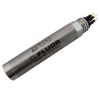Zebra-Tech Turner Designs C-FLUOR Hydro-Wiper
Features
- Highly effective brush technology for both marine and fresh water
- Precision on-board clock for accurate wipe interval timing
- Simple sensor installation and operation with user-replaceable brush
- Free ground shipping
- Expedited repair and warranty service
- Lifetime technical support
- More
Overview
The Zebra-Tech Turner Designs Cyclops-7 Hydro-Wiper is a mechanical wiper system designed to fit easily to the Turner Designs Cyclops-7 and C-FLUOR. Using a regular gentle brushing action, the Hydro-Wiper keeps the optical window of the Turner Designs Cyclops-7/C-FLUOR clean from bio-fouling and other unwanted deposits such as mud. The Hydro-Wiper reduces the need for costly site visits to manually clean the instrument, maintaining data integrity throughout long deployments.
Self-Contained
The Zebra-Tech Turner Designs Cyclops-7 Hydro-Wiper consists of a wiper unit that is attached to the instrument by a purpose-designed clamp. The wiper unit is connected to a rugged underwater housing that contains the batteries, control electronics, diagnostic LED and wipe interval select switch.
Data Logging
The control module is a small, rugged wiring panel connected to a power supply and a data logger. The data logger initiates wipes using a trigger signal. Synchronizing the wipe with measurements from the instrument ensures data quality that remains consistent throughout the deployment.
In The News
Monitoring Aquatic Ecosystems: How Science Drives Waterway Management in Northwest Georgia
The University of Georgia is home to multiple labs that focus on monitoring aquatic ecosystems and organisms across the state. The River Basin Center connects these monitoring efforts with external partners, including government agencies and NGOs, to inform management and restoration of the state’s waterways. Phillip Bumpers is a Postdoctoral Associate in the Rosemond lab and the Wenger lab at the Odum School of Ecology and an affiliate of the River Basin Center. An aquatic ecologist, Bumpers’ research focuses on quantifying how environmental variability shapes aquatic ecosystems and understanding the drivers of these trends.
Read MoreFrom Paddles to Phytoplankton: Studying Vermont’s Wildest Lakes
For six months of the year, Rachel Cray, a third-year PhD student at the Vermont Limnology Laboratory at the University of Vermont, lives between a microscope and her laptop, running data. For the other six months, she is hiking and canoeing four of Vermont’s lakes, collecting bi-weekly water samples. Cray studies algal phenology across four lakes in Vermont, US, that have low anthropogenic stress—or in other words, are very remote. Funded by the National Science Foundation Career Award to Dr. Mindy Morales, the lakes Cray researches part of the Vermont Sentinel Lakes Program, which studies 13 lakes in the area and, in turn, feeds into the Regional Monitoring Network, which operates in the Northeast and Midwest US.
Read MoreReimagining Water Filtration: How Monitoring and Science Enhance FloWater Filtration Systems
Over 50% of Americans think their tap water is unsafe , according to the Environmental Working Group (EWG). Other recent surveys have found that number to be as high as 70% of persons surveyed. Whether due to increased public awareness of water quality issues or confusion about how municipal water sources are regulated, there is a clear distrust of tap water in the United States. According to industry expert Rich Razgaitis, CEO and co-founder of the water purification company FloWater, this issue creates a damaging cycle. Razgaitis explained that the health and environmental problems associated with contaminated water aren’t the only issues. As people become increasingly aware that some tap water is unsafe, they resort to bottled water.
Read More







